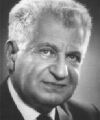Template:Selected anniversaries/June 29: Difference between revisions
No edit summary |
No edit summary |
||
| Line 19: | Line 19: | ||
||1895 – Thomas Henry Huxley, English biologist (b. 1825) | ||1895 – Thomas Henry Huxley, English biologist (b. 1825) | ||
File:Boris_Podolsky.jpg|link=Boris Podolsky (nonfiction)|1896: Physicist [[Boris Podolsky (nonfiction)|Boris Yakovlevich Podolsky]] born. He will work with [[Albert Einstein (nonfiction)|Albert Einstein]] and [[Nathan Rosen (nonfiction)|Nathan Rosen]] on entangled wave functions and the [[EPR paradox (nonfiction)|EPR paradox]]. | |||
||1900 – Ivan Mikheevich Pervushin, Russian mathematician and academic (b. 1827) | ||1900 – Ivan Mikheevich Pervushin, Russian mathematician and academic (b. 1827) | ||
Revision as of 18:21, 27 November 2017
1868: Astronomer and journalist George Ellery Hale born. He will discover magnetic fields in sunspots, and be leader or key figure in the planning or construction of several world-leading telescopes.
1869: Niles Cartouchian and Egon Rhodomunde Confront Gnotilus wins Pulitzer Prize for Most Astonishing Illustration of the Year.
1895: Biologist Thomas Henry Huxley dies. He is known as "Darwin's Bulldog" for his advocacy of Charles Darwin's theory of evolution.
1896: Physicist Boris Yakovlevich Podolsky born. He will work with Albert Einstein and Nathan Rosen on entangled wave functions and the EPR paradox.
1963: Physicist and educator Nikolay Basov uses new theory of quantum electronics to detect and prevent crimes against mathematical constants.




